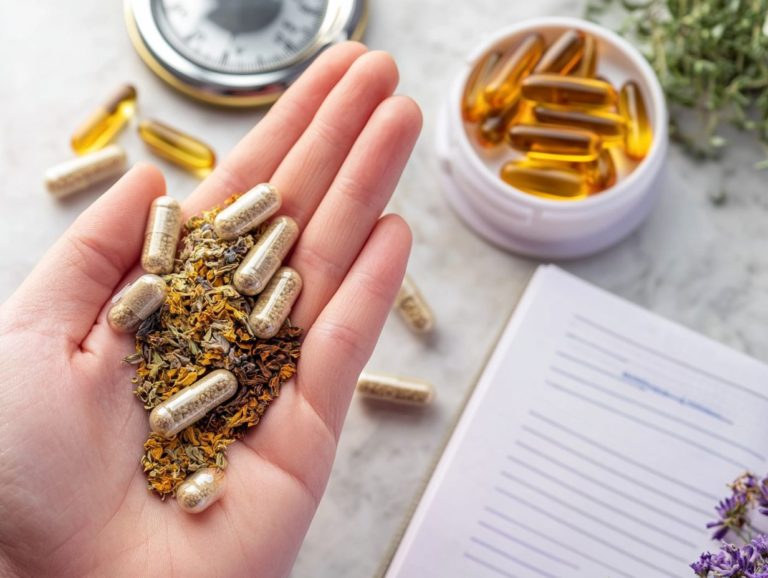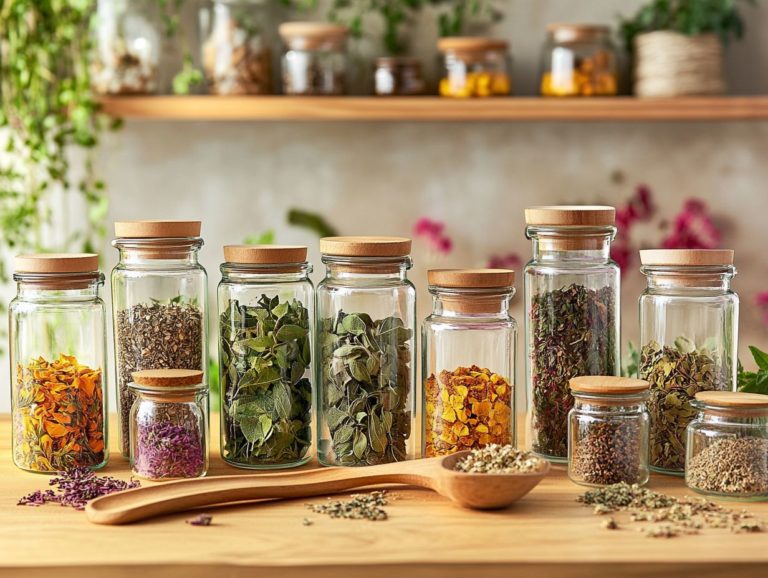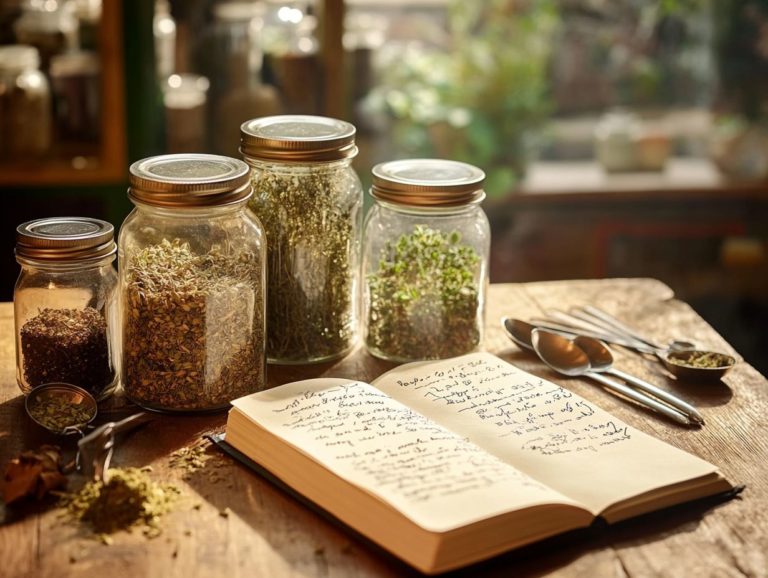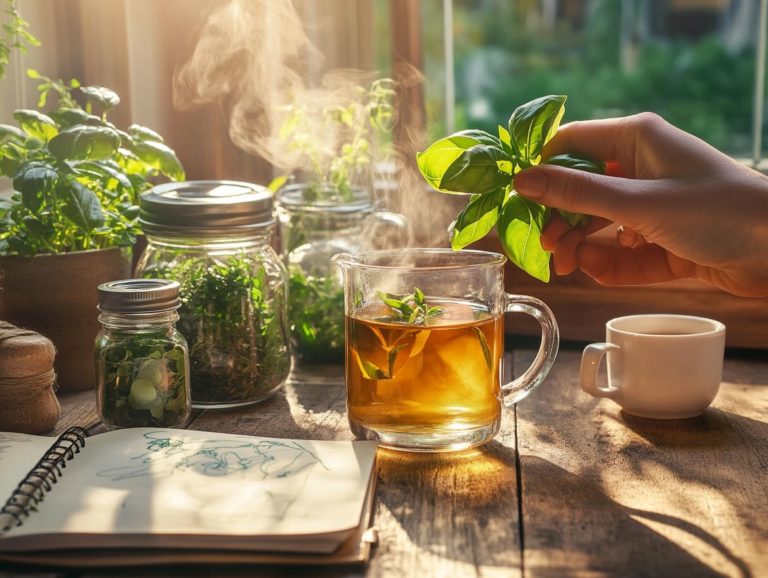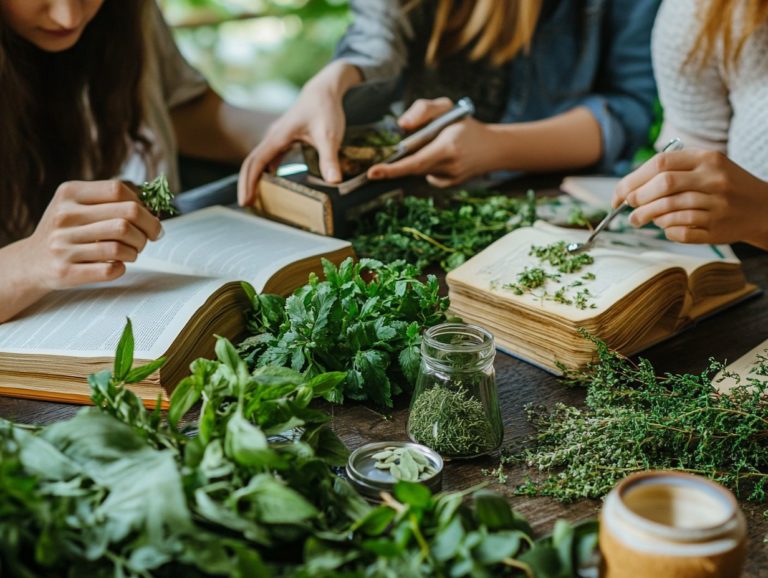5 Herbal Dosage Facts You Should Know
Herbal remedies have surged in popularity as natural alternatives to conventional medicine. It is essential to understand how to use them safely and effectively.
This article explores five key facts about herbal dosage that every user should know. You ll uncover important considerations regarding dosage factors and the various forms herbs take before embarking on your herbal journey.
Discover the positive impact that consulting a professional can have on your wellness routine. This ensures you make informed choices for your health.
Contents
- Key Takeaways:
- 1. Mastering Herbal Dosage
- 2. Factors That Affect Herbal Dosage
- 3. Exploring Different Forms of Herbal Dosage
- 4. Recommended Dosage for Common Herbs
- 5. Importance of Consulting with a Professional
- What Is Herbal Dosage and Why Is It Important?
- What Are the Different Units of Measurement for Herbal Dosage?
- How Does Age and Weight Affect Herbal Dosage?
- What Are the Different Forms of Herbal Dosage and How Do They Work?
- What Are the Recommended Dosages for Commonly Used Herbs?
- Why Is It Important to Consult with a Professional Before Taking Herbal Supplements?
- Frequently Asked Questions
Key Takeaways:
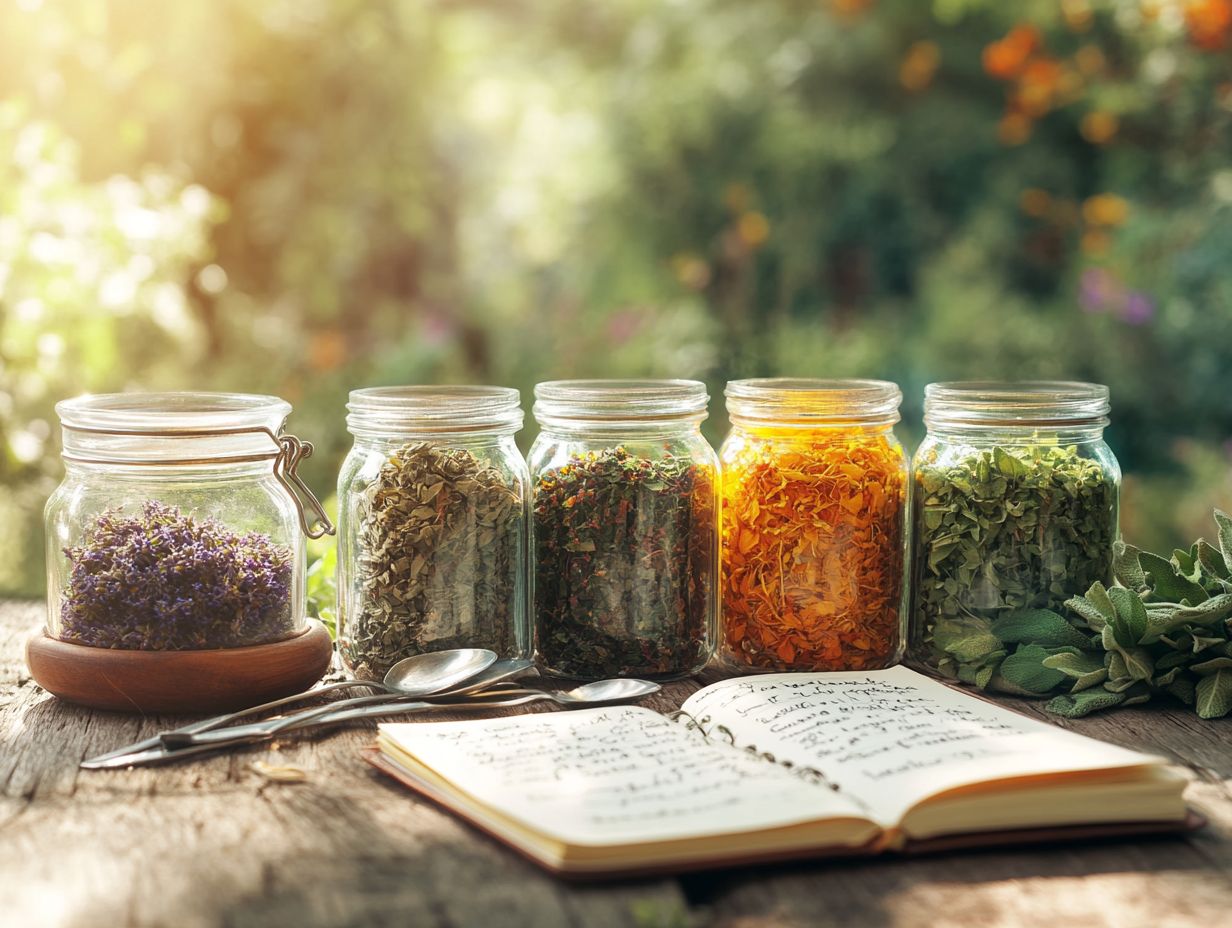
- Understanding herbal dosage is crucial for safe and effective use of herbal supplements.
- Age, weight, and health conditions can significantly influence the recommended herbal dosage.
- Consulting with a professional is essential to determine the right herbal dosage for your individual needs.
1. Mastering Herbal Dosage
Grasping herbal dosage is vital for using herbal supplements safely. These supplements have played a significant role in traditional medicine for centuries, addressing various health conditions like anxiety, immune support, and digestive issues.
Herbal dosage involves not just the quantity of the herb but also its preparation, timing, and method of ingestion. Each of these factors influences overall effectiveness. For safe practices, consider following safety tips for creating herbal remedies and take into account your age, weight, pre-existing health conditions, and metabolic rate, as these can affect how well you absorb and respond to herbal treatments.
Quality is paramount. Sourcing products from reputable suppliers and ensuring they comply with safety regulations can safeguard your health. By understanding these intricacies, you can adopt a responsible approach that enriches your experience with natural remedies.
2. Factors That Affect Herbal Dosage
Several factors can influence the ideal herbal dosage for you. These include your age, weight, and any specific health conditions. These variables can change how your body metabolizes herbal supplements like Ginseng and Turmeric.
For example, younger individuals may process Ginseng more efficiently than older adults, requiring different dosages for similar effects. Weight also plays a crucial role; a heavier person might need to adjust their Turmeric intake for optimal results while someone lighter may find that lower doses are effective.
Moreover, preexisting health conditions like diabetes or hypertension can complicate dosage guidelines. Understanding these factors is vital for ensuring both safety and efficacy when adding herbal supplements to your routine.
3. Exploring Different Forms of Herbal Dosage
Herbal supplements come in various forms liquid extracts, capsules, and teas each offering unique advantages and dosage considerations tailored to health conditions, such as immune support, cardiovascular health, and anxiety management.
Liquid extracts often have higher bioavailability, meaning they are absorbed more quickly into the bloodstream. This makes them ideal for those seeking immediate relief. In contrast, capsules offer convenience, delivering precise dosages easily. If you prefer tradition, teas can provide a soothing, hydrating ritual.
It’s crucial to evaluate your personal preferences and specific health goals when selecting the right form. Each option has distinct implications for effectiveness and overall health benefits, so choose wisely.
Have you tried herbal remedies? Reflect on your experiences and consider sharing them with others who may benefit from your insights.
4. Recommended Dosage for Common Herbs
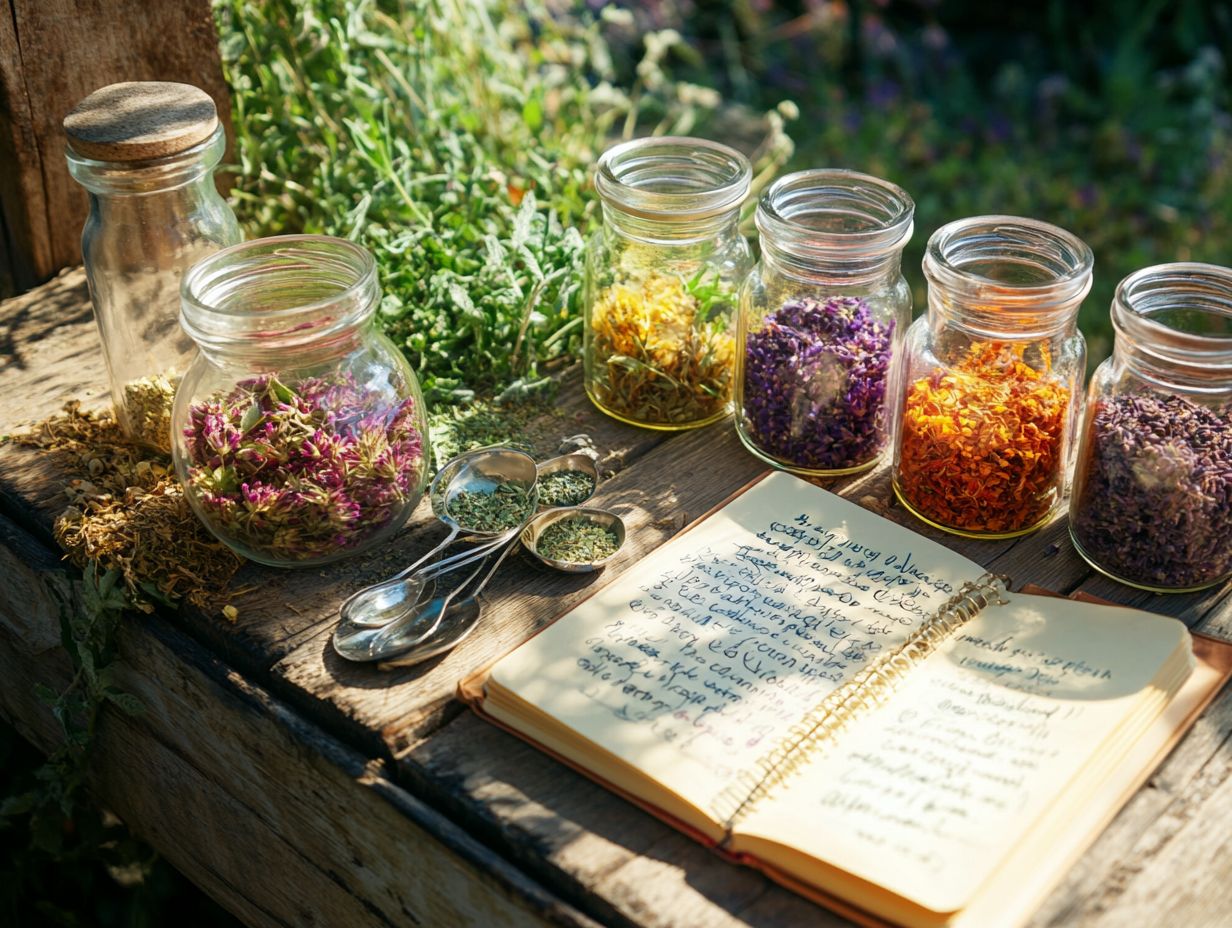
Recommended dosages for popular herbs like St. John’s Wort, Ginkgo biloba, and Echinacea vary based on their medicinal uses. Understanding these recommendations is key to effective treatment while minimizing side effects.
For example, when it comes to St. John’s Wort, you might consider doses ranging from 300 to 900 mg of standardized extract per day for mild to moderate depression. This can fluctuate depending on your individual response and specific health conditions.
Ginkgo biloba generally suggests a daily intake of 120 to 240 mg to support cognitive function. The ideal dosage may differ based on whether you’re looking to enhance memory or alleviate anxiety.
Echinacea is often recommended during cold and flu seasons, with a typical dosage of 300 to 500 mg of extract three times a day. However, factors like your age and the severity of your symptoms might require adjustments.
Thus, consulting with a healthcare professional is a crucial step to ensure you re making the best choices for your health!
5. Importance of Consulting with a Professional
Consulting with a professional, such as a qualified herbalist, is essential when you re considering herbal supplements. This step ensures their safe and effective use, especially given the complexities of herbal interactions and the lack of FDA regulations for many herbal products.
A knowledgeable herbalist can offer tailored recommendations that take into account your unique health conditions, existing medications, and overall lifestyle details that self-prescribing often overlooks. By conducting a thorough assessment, they can help you navigate potential risks, including adverse reactions and interactions with pharmaceutical drugs, ensuring a holistic and informed approach to your health.
Understanding herbal properties is crucial. Misunderstandings can lead to unintentional side effects, making professional guidance essential. For reliable information, refer to dosage recommendations for popular herbs. This collaboration creates a safer and more effective path to wellness, allowing you to harness the benefits of herbs with confidence.
What Is Herbal Dosage and Why Is It Important?
Herbal dosage refers to the specific amount of an herbal supplement you should take to feel the desired effects, like relief from a cold. It plays a crucial role in herbal medicine, as understanding the correct dosage can significantly impact how effectively medicinal plants treat various health conditions.
Historically, herbalists relied on experience and tradition to determine effective dosages, passing down insights through generations. This reflects a collective wisdom built on trial and error. In today s world, this age-old knowledge is complemented by scientific research aimed at standardizing dosages for enhanced safety and effectiveness. This dual approach ensures you can harness the healing properties of herbs while minimizing any potential adverse effects.
For anyone exploring natural remedies, recognizing the importance of precise measurement and adhering to recommended dosages is essential. This practice not only optimizes health outcomes but also fosters a safe environment in the realm of herbal medicine.
What Are the Different Units of Measurement for Herbal Dosage?
Herbal dosage can be measured using various units, such as milligrams (mg), grams (g), and fluid ounces (fl oz). Understanding these measurements is essential for determining how much of an herbal product, like Ginger or Chamomile, you should consume to reap optimal health benefits.
Each measurement corresponds to different forms of herbal products, so it’s crucial to grasp their nuances. For instance, if you’re working with dried herbs, you’ll typically measure them in grams or ounces. On the other hand, tinctures—those potent liquids extracted from herbs—are often measured in fluid ounces. When dealing with capsules or tablets, dosage is usually expressed in milligrams. To learn more about the appropriate dosages for various herbal products, check out understanding herbal dosage.
Precision in these measurements is vital; even minor variations can significantly impact the effectiveness of the remedy. Whether you’re brewing a calming cup of Chamomile tea or reaching for a robust Ginger tincture, maintaining accuracy in your measurements is essential. To further ensure safety, be aware of common herbal dosage mistakes to avoid, which helps you receive the intended benefits while steering clear of potential adverse effects.
Have you ever wondered how much herbal supplement you need for the best results? Understanding the role of body weight in herbal dosage can be crucial. Talk to a qualified herbalist today to discover the perfect herbal regimen for you!
How Does Age and Weight Affect Herbal Dosage?
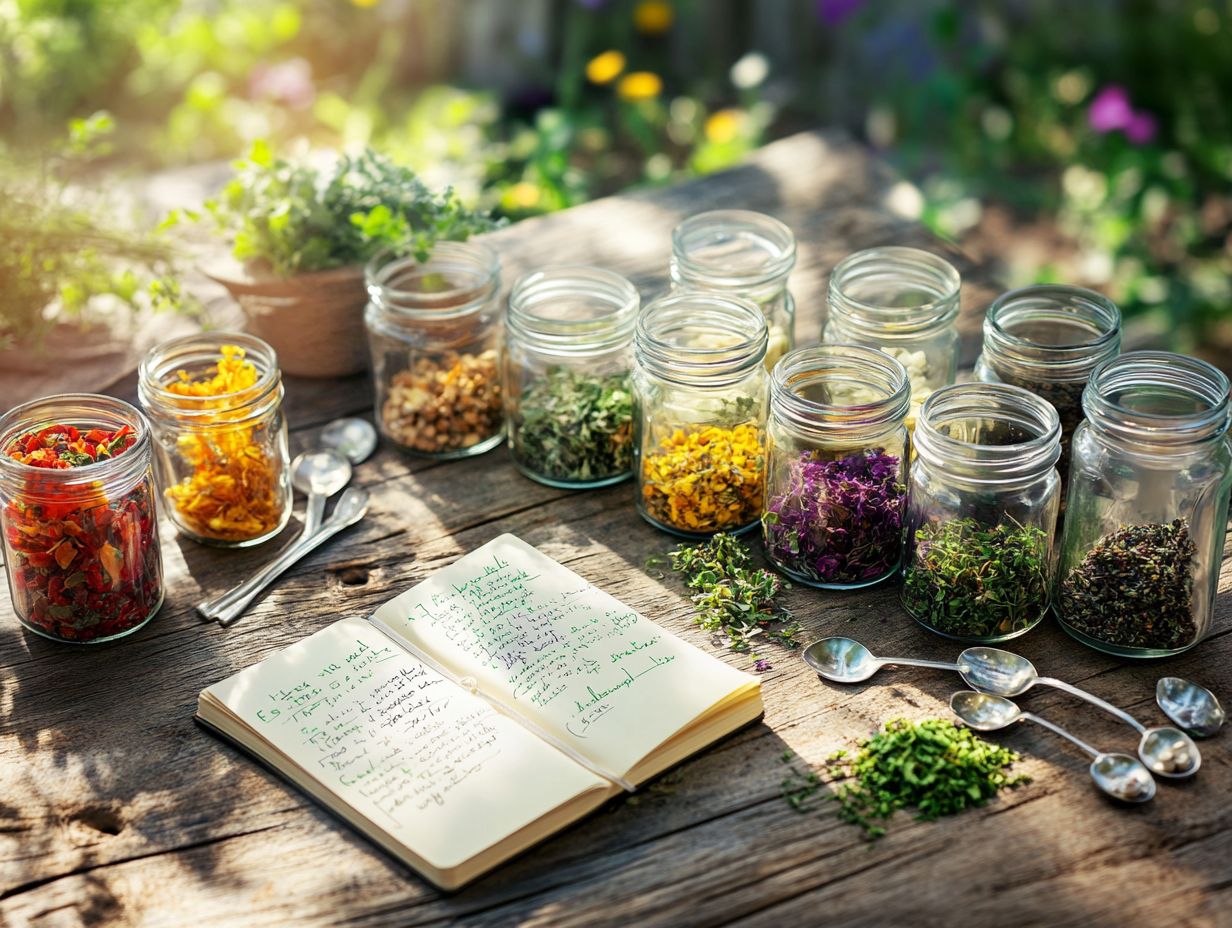
Age and weight play pivotal roles in determining the right herbal dosage for you. These factors significantly influence how your body processes food and supplements, including herbal products like Licorice Root and Elderberry.
For example, children typically require lower dosages due to their smaller body size and developing systems. This highlights the importance of calculating dosages based on weight rather than adhering to a standard amount.
On the flip side, as you age, your body may metabolize herbs differently. This can sometimes mean lower doses are necessary to avoid unwanted side effects. To ensure you are taking the right amounts, it’s important to understand how to measure herbal dosages accurately. If you have a higher body composition, you may need to increase your dosages to feel the effects!
This customized approach not only ensures safety but also maximizes efficacy. Personal factors should always guide your decisions in herbal supplementation. For instance, take Marshmallow root: while it may be safe for various age groups, its dosage needs to be carefully tailored to your specific circumstances. For more information, refer to herbal safety guidelines.
What Are the Different Forms of Herbal Dosage and How Do They Work?
Different forms of herbal dosage like liquid extracts, capsules, and herbal teas offer unique mechanisms of action and absorption rates. These can significantly impact their effectiveness in promoting your health and wellness.
Take liquid extracts, often called tinctures. They are more concentrated and absorbed rapidly into your bloodstream, making them an excellent choice if you’re seeking quick relief.
On the other hand, capsules provide a controlled dosage, perfect for those who appreciate convenience. However, your body may take a bit longer to digest them.
Herbal teas offer a gentler and more hydrating option, extracting beneficial compounds through steeping.
Consider ginger as an example; you can enjoy it in all these forms. While ginger tea can effectively soothe digestive discomfort, a concentrated tincture may deliver faster anti-inflammatory effects. Each method reflects traditional practices, illustrating how the roots of herbal medicine blend seamlessly with modern approaches.
What Are the Recommended Dosages for Commonly Used Herbs?
Recommended dosages for popular herbs like St. John’s Wort, Ginkgo biloba, and Turmeric can vary significantly. This reflects their unique health benefits and the specific conditions they aim to address. Understanding these nuances is essential for tailoring your approach to herbal supplementation.
Take St. John’s Wort, for example. A suggested dosage is 300 mg three times a day for mild to moderate depression, but this can shift based on your metabolism and any medications you may be taking.
Similarly, with Ginkgo biloba, doses ranging from 120 to 240 mg per day may boost cognitive function, yet this can also vary depending on your individual health needs.
As for Turmeric, renowned for its anti-inflammatory properties, daily recommendations typically fall between 500 and 2,000 mg, depending on the condition you’re treating.
Therefore, consulting with healthcare professionals is essential for ensuring effective and safe use of these herbs.
Why Is It Important to Consult with a Professional Before Taking Herbal Supplements?
Consulting with a professional, such as a qualified herbalist or healthcare provider, is essential before diving into the world of herbal supplements. They can offer personalized guidance and pinpoint any potential interactions that might significantly influence your treatment outcomes.
This professional insight isn’t just about safety; it’s also about customizing dosages to meet your unique needs. Many people often overlook the importance of understanding how herbal remedies might interact with their current prescription medications. For pregnant women, following herbal dosage guidelines is crucial to avoid unintended side effects or decreased treatment efficacy.
By engaging with knowledgeable practitioners, you can amplify the therapeutic benefits of herbal products while keeping risks at bay. Ultimately, these consultations pave the way for a more holistic approach to your health, ensuring that you achieve your personal health goals safely and effectively.
Frequently Asked Questions
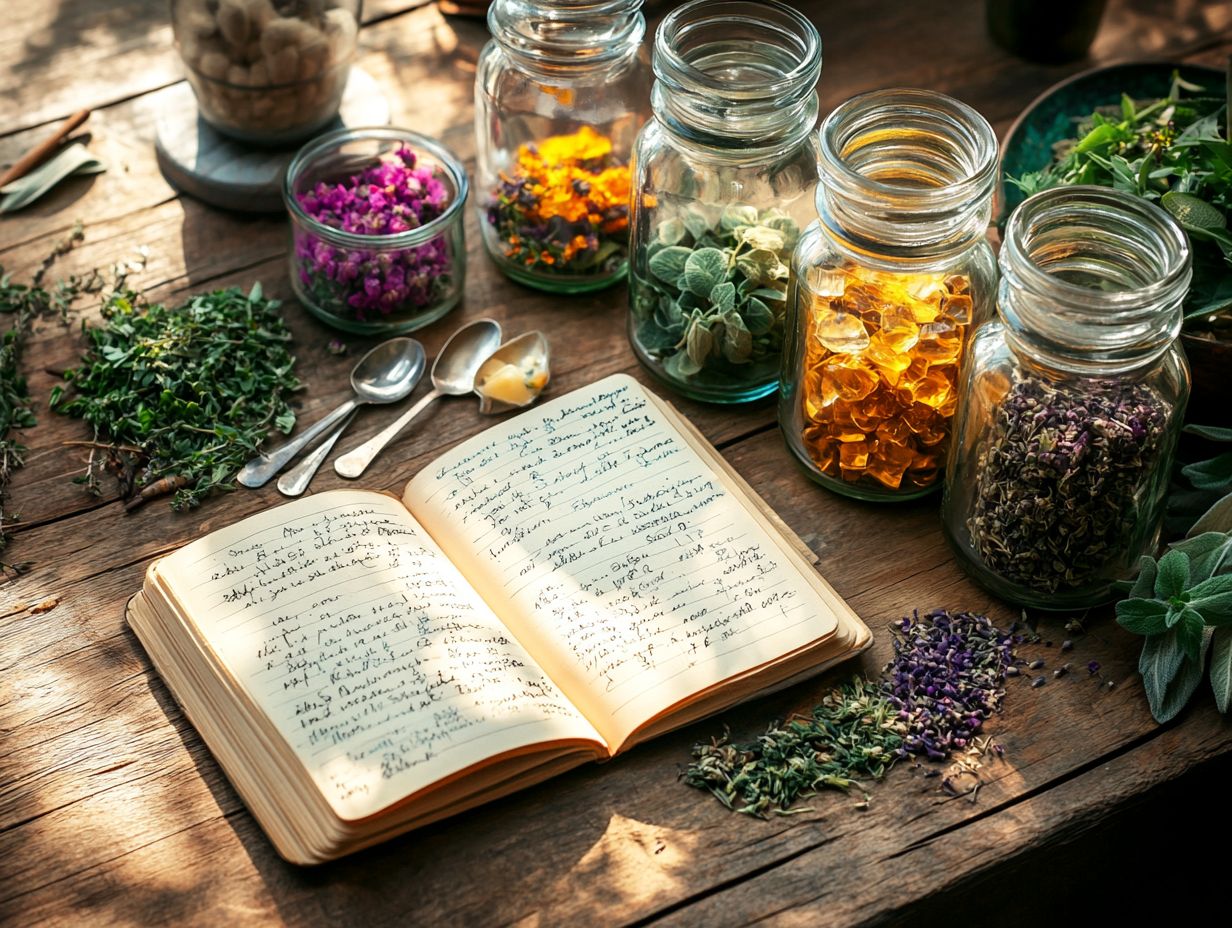
1. What are herbal dosages and why are they important?
Herbal dosages refer to the recommended amount of a specific herb or herbal supplement for a certain condition. Taking the right dosage ensures safe and effective results.
2. Are all herbal dosages the same?
Herbal dosages can vary depending on the type of herb and the form it is taken in (capsule, tea, or a liquid extract of herbs). They also depend on your age, weight, and health status.
3. Can I adjust herbal dosages on my own?
No, it is not recommended to adjust herbal dosages without professional guidance. Herbal supplements can interact with medications, so always consult a healthcare professional or experienced herbalist.
4. Are there any risks associated with herbal dosages?
While most herbal remedies are safe, it’s crucial to be aware of potential side effects! Always inform your healthcare provider about any herbal supplements you re taking.
5. What happens if I miss a dose of my herbal supplement?
If you miss a dose, don t worry! Just take it as soon as you remember unless it s almost time for your next one.
6. Can I take multiple herbal supplements at once?
It is generally safe to take multiple herbal supplements, but it’s important to consult with a healthcare professional. They can help ensure there are no potential interactions or adverse effects.

